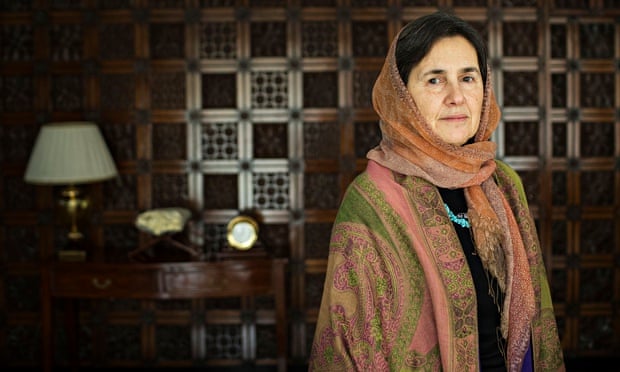

The wife of president Ashraf Ghani has surprised many Afghans by speaking out on women and internally displaced people
When Ashraf Ghani gave his inaugural speech as he entered Afghanistan’s presidential palace in September, he did something few people expected of their country’s new leader – he praised the work of his wife Rula, and thanked her for her support.
The former president Hamid Karzai never appeared in public with his wife during his 10 years in office. Now, Ghani was proclaiming that his spouse would wield political influence. Three weeks ago, she began making good on that promise, and set up an office in the palace to advise on how to improve conditions for the country’s at least 750,000 internally displaced people (IDPs).
Rula Ghani is certainly aware that she is doing something exceptional for a presidential spouse in Afghanistan, and that her actions will not go without scrutiny. When the Guardian met her at the Arg, the heavily guarded palace designed to resemble a castle in the centre of Kabul, Rula Ghani was closely tailed by advisers and careful to state her opinions without ambiguity; she had recently been the subject of fierce criticism after a report published last week quoted her as saying she supported France’s ban on the niqab.
After being derided by conservatives, and defended by rights activists, Afghanistan’s first lady claimed she had been “quoted out of context”.
“People are saying I am against the chador,” she said, referring to the Islamic headscarf that she wears. “I am not. On the contrary. I am for traditional family values.”
Born and raised in a Christian family in Lebanon, Rula met her future husband while studying political science at the American University in Beirut. She had previously studied at Sciences Po in Paris where the 1968 student riots helped ignite her political zest. She married in 1975 and spent the next couple of years in Afghanistan. Times were different then, she recalled, not least for women. The burqa, or chadari, which is now ubiquitous in many rural areas, was not very common, she said.
“It was very little used … only for trips between province and city,” she said, acknowledging that the dress has since become an integral part of Afghan culture. “Chadaris, as far as I’m concerned, I think should be a personal choice of the women and the members of her family. I personally would not wear a chadari.”
Before the 1978 civil war, the Ghanis moved to the United States where he pursued a PhD, while she raised the couple’s two children. When Ashraf was appointed finance minister in 2002, they moved back to Afghanistan. In Kabul, Mrs Ghani volunteered for six years at Aschiana, a non-governmental organisation providing services to families of children who work in the streets, a lot of whom were IDPs.
Decades of conflict have uprooted many families, and an increasing number are converging on the fringes of cities with few resources and little governmental support.
“It’s really a desperate situation. It’s people who are almost deprived of identity,” she said. “They have nowhere to go, and nobody to help them, nobody to protect them.”
She recalls a woman in an IDP camp who had been sleeping on the bare dirt with her infant child. One winter night, when rain had muddied the ground, they both froze to death. “I think no human being can accept that,” she said.
In February, Afghanistan launched Asia’s first IDP policy. A first step to improving conditions for Afghanistan’s displaced people, she said, is to recognise that their settlements are unlikely to be temporary.
“Everybody would love to have [IDPs] go back to the village they came from, or to the province they came from. And in many cases it’s not possible because facts on the ground have changed the situation, and there is nowhere for them to go back to,” she said.
“The government needs to have a comprehensive policy, in which IDPs are no longer IDPs, but Afghan citizens who are facing problems of no housing, no job, no education, no water.”
However, as she has already found, directing attention towards her policy issue and away from her persona will be a challenge. Religious scholars and political foes are already resorting to direct attacks, calling the mere presence of a Christian, foreign-born first lady in the palace a threat to Islam.
“We need a Muslim president and his family needs to be Muslim,” Qazi Nazir Ahmad Hanafi, a conservative MP from Herat province, told the Guardian. “If Mr Ghani tries to live with a Christian wife, the nation will know about it, and eventually people will go to the palace and destroy it.”
Other opponents, like the rabble-rousing governor Atta Muhammad Noor, have claimed that Rula Ghani and her children are not Afghan.
Rula, who holds Afghan, Lebanese and American citizenship, has tried to deflect such criticism. She recently took an Afghan name, Bibi Gul, following her husband’s use during the election campaign of his tribal last name, Ahmadzai, to remind Pashtun voters of his roots.
With her public profile, Mrs Ghani is a rarity in Afghan history but not a first. She has inevitably drawn comparisons to Queen Soraya, wife of Amanullah Khan who ruled the country from 1919. Soraya, whose ideas of modernity and women’s role in society both inspired and incensed, is blamed by some for ultimately forcing herself and her husband into exile in 1929.
“People who want to criticise can always do it,” Mrs Ghani said with a smile, dismissing the notion that her personal views could cause political trouble for the president. “I don’t think my husband’s work depends on what I say and what I do. My husband stands on his own two feet.”
Rula Ghani’s role in the presidential palace mirrors that of American first ladies and others, who often use their place in the limelight to advocate for issues close to their hearts. Michelle Obama fights childhood obesity, and Laura Bush championed Afghan women’s rights, both to worldwide admiration. Mrs Ghani says she is looking to inspire women in Afghanistan, which is still considered to be one of the worst countries in the world for women’s rights.
“I want to let them know that they are very courageous women. Often during the war, men are absent. It’s the woman who carries the family,” she said. “The media, especially the international media, have presented an image of Afghan women as weak, as women that are really leading horrible lives. I don’t want to in any way diminish the problems that women are facing,” she said. “But women here in Afghanistan have played a very important role. And maybe it’s time that we should recognise them and celebrate them for that.”


No comments:
Post a Comment